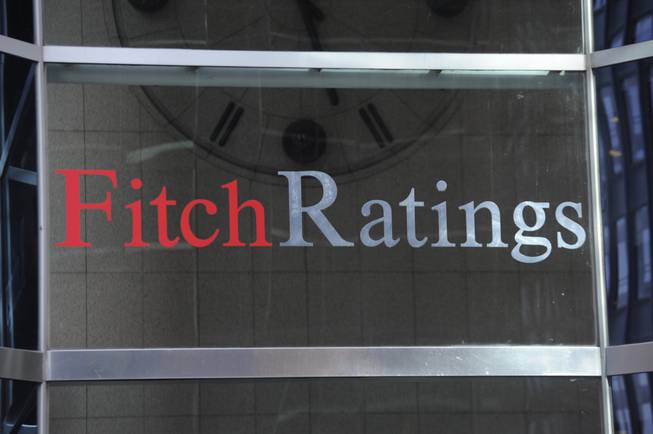
Henny Ray Abrams / AP
This photo shows 1 State Street Plaza, home of Fitch Ratings, Sunday, Oct. 9, 2011 in New York.
Thursday, July 11, 2013 | 2:39 p.m.
Related document
A global financial agency lowered its rating of Clark County School District bonds, marking the third consecutive year of rating downgrades.
Fitch Ratings, a New York City-based firm, downgraded $3.2 billion worth of School District debt, from AA- to A, and issued a negative outlook on the bonds.
Another bond rating agency, Standard & Poor’s, recently released its rating for Clark County School District debt. The agency reafffirmed its previous rating of AA-, and maintained a negative rating outlook.
Fitch has downgraded the School District's bonds each year since April 2010, when it received an AA+ rating.
Here are some of the major factors that resulted in CCSD's rating downgrade this year, according to Fitch:
• Lack of funding: The School District's financial operations have been hampered by "diminished state and local revenues countered with significant cuts and reserve drawdowns."
The district made more than $300 million in spending cuts through fiscal 2012, including cuts in administration and school supplies, increased class sizes, reduced bussing and pay freezes and increased benefits contributions for employees.
The district also transferred money from reserve funds to operate its schools. As a result, the general ending fund balance – which is used in financial emergencies – has dipped to about $72 million, or 3.6 percent of spending. Most economists advise a 4 percent or higher ending fund balance.
• Difficult labor relations: In May 2012, an arbitration decision forced the School District to continue paying salary step increases to teachers, causing the reduction of 1,015 teaching positions last school year. However a "more recent ruling favorable to the district allowed it to restore more than 700 positions for fiscal 2014."
• Struggling economy: Las Vegas continues to suffer from a high unemployment rate. As the population boom subsides, student enrollment has stabilized but the tax base has shrunk, squeezing the district's tax revenue. Assessed property values also have declined by more than half – to 2005 levels.
However, there are some indications the economy is starting to rebound. The district's sales tax revenue has improved, and Las Vegas housing prices have gone up by nearly a quarter from April 2012 to 2013. The unemployment rate has come down, although it is still stubbornly higher than the national average.
• Growing pension costs: "Costs are expected to rise steeply in the coming years with increasing contribution rates." During fiscal year 2013, the School District's pension costs were about 24 percent of its payroll.
• Substantial and unfunded facility needs: "The district currently has very limited capacity to fund its substantial capital needs" after voters overwhelmingly rejected a proposal in November 2012 that would have raised property tax rates to fund school construction and renovations. The district currently does not have the capacity to issue and authorize bonds.
Fitch warned of future rating downgrades unless the School District rebuilds its reserves and finds more funding for school maintenance, which has been deferred during the recession.
The School District has a plan to improve its finances, Fitch analysts said in the report.
The School District will add $5 million per year to its reserve funds over the next four years to boost its ending fund balance.
The Nevada Legislature also has increased per-pupil funding by 3.8 percent, which coupled with a 1,335 student increase in enrollment, will translate to more money for school operations.
A recent arbitration victory will allow the district to restore about 800 teaching positions for fiscal 2014, lowering class sizes for students.
Fitch anticipates the School District will restructure its some of its bonds or to raise the tax rate because its debt repayment as a percentage of district spending is high.
"The district has limited capacity to fund future capital needs totaling several billion dollars," Fitch's report stated. "Fitch views the inability to finance the ongoing maintenance of assets as a credit concern. … Given the size of its asset base, Fitch is concerned that the district will have difficulty in funding basic repairs and rehabilitation of existing structures."
The School District is weighing its options, including restructuring its debt and further delaying renovations and maintenance projects. School District spokeswoman Melinda Malone said the Fitch rating downgrades wouldn't affect the district's ability to repay its debt.
"In the face of a downed economy, it is not unprecedented to see a change in the rating of a government entity such as CCSD," Malone said in a statement. "The district has a plan to repay debt, and this rating change does not impact that plan."
•••
Here are CCSD’s bond ratings over the years, according to Fitch Ratings.
(The investment grade ratings are as follows from highest to lowest: AAA, AA, A and BBB, with plus and minus grades. Non-investment grade ratings go from a high of BB to D.)
- February 2005: AA, with a stable rating outlook
- April 2009: AA, with a negative rating outlook
- April 2010: AA+, with a negative rating outlook
- May 2010: AA, with a stable rating outlook
- February 2011: AA-, with a negative rating outlook
- September 2012: A+, with a stable rating outlook
- July 2013: A, with a negative rating outlook

Join the Discussion:
Check this out for a full explanation of our conversion to the LiveFyre commenting system and instructions on how to sign up for an account.
Full comments policy